Want to know more about the Best Biochemistry Schools In the US and make an informed decision? Here is a good place to start.
Biochemistry is a rapidly advancing field that holds the key to unlocking many of the mysteries of life and the human body. As such, it’s no wonder that many students are drawn to the study of biochemistry.
If you’re one of these students, you’re probably wondering where you should pursue your studies in biochemistry. We’ve compiled a list of the best US biochemistry schools to help you search.
These schools, all known for their excellence in the field of biochemistry, offer an array of opportunities to students who want to succeed.
In this blog post, we’ll go over the top biochemistry schools in detail, giving you all the information you need to decide where to pursue your studies. Let’s get started!
Please note that the order in this list might vary by ranking criteria and sources. Please see our criteria at the bottom.
Table of Contents
#25. University of Texas at Austin

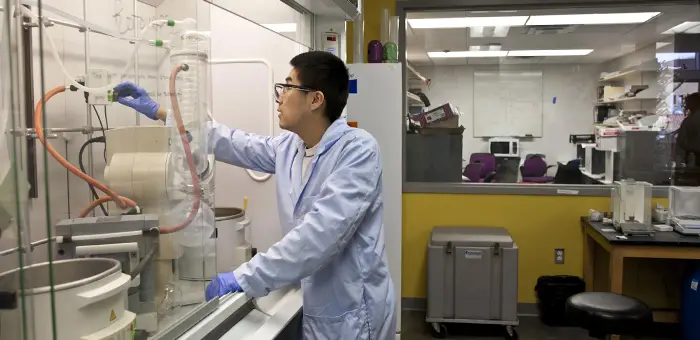
- Acceptance rate: 32%
- Average entry score: 1230-1500 SAT or 29-34 ACT
- Student-to-faculty ratio: 16:1
- Estimated cost of attendance (tuition and fees): $28,928-$57,512
- Average earning potential for graduates: $36,500 (College Simply)
The University of Texas at Austin ranks second among the state’s universities for its biochemistry programs.
This institution offers a bachelor’s and a doctorate in biochemistry. Both degrees prepare students for a career as biochemists. It also provides them with the necessary skills to conduct research in this field.
The university’s biochemistry curriculum gives students a firm foundation in their field of study. Students gain experience in the field while they are working on their research projects.
#24. Boston College

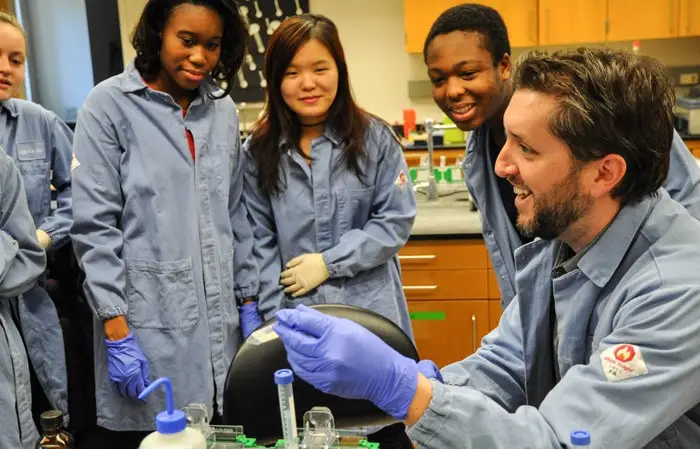
- Acceptance rate: 19%
- Average entry score: 1420-1530 SAT or 33-34 ACT
- Student-to-faculty ratio: 11:1
- Estimated cost of attendance (tuition and fees): $64,176
- Average earning potential for graduates: $34,995
Boston College offers a bachelor’s degree in biochemistry that prepares students for graduate school. Students studying biochemistry at Boston College gain a thorough understanding of the field, including how to conduct experiments and analyze data.
Boston College’s Chemistry and Biology departments work closely together, which allows students to take classes from both. This allows them to learn about biochemistry from both a chemistry and biology perspective.
Boston College’s faculty has a wealth of experience in their respective fields. They help students develop an understanding of key concepts. Students also have an opportunity to conduct research and gain work experience.
#23. University of California, San Diego
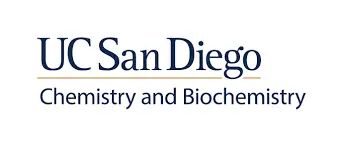
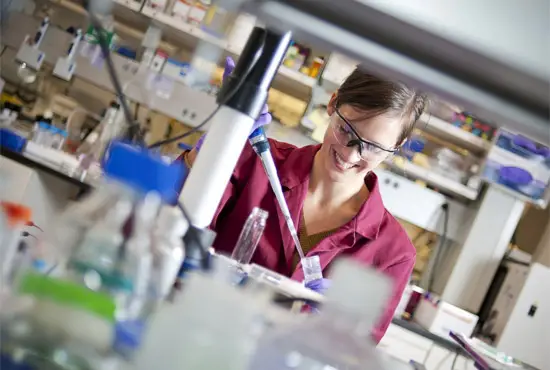
- Acceptance rate: 34.2%
- Average entry score: 1270-1480 SAT or 28-34 ACT
- Student-to-faculty ratio: 12:1
- Estimated cost of attendance (tuition and fees): $36,061-$65,835
- Average earning potential for graduates: $33,915 (College Factual)
UCSD’s Chemistry and Biochemistry department has an excellent reputation for its research. The department offers undergraduate degree programs in environmental chemistry, biochemistry, and chemistry.
This is a great school for students who are interested in learning about chemistry and biochemistry. The department has many faculty members who devote their time to helping students succeed. UCSD’s many research opportunities make it an attractive destination for students.
These programs give students a chance to research with faculty members on projects related to their field. The environment at UCSD is very friendly and supportive. UCSD’s location also provides students with many options for entertainment and activities outside of class.
#22. University of California, Irvine

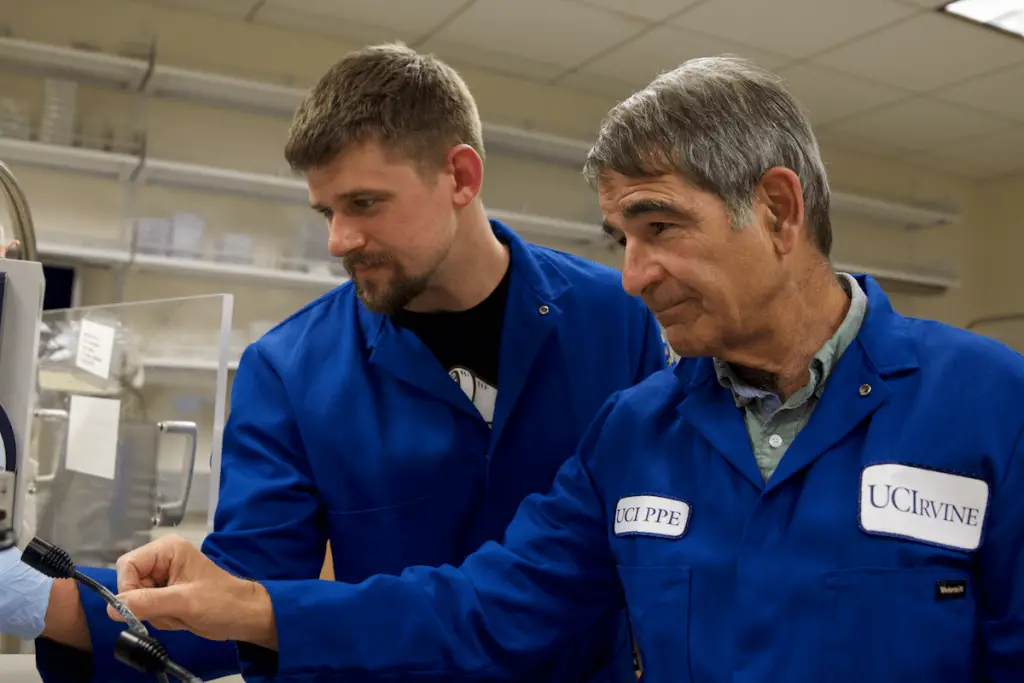
- Acceptance rate: 28.8%
- Average entry score: 1230-1430 SAT or 26-33 ACT
- Student-to-faculty ratio: 18:1
- Estimated cost of attendance (tuition and fees): $ 34,161-$63,915
- Average earning potential for graduates: $61,800 (After 10 years, College Simply)
The University of California, Irvine, is a great school for students who are interested in science, technology, engineering, and math (STEM). UCI has many programs and research opportunities that allow students to explore these fields.
This school’s biochemistry and molecular biology major provides students with many career opportunities, including research positions and jobs related to medicine and health. It emphasizes a hands-on learning approach, enabling students to gain real-world experience in their field.
The university’s facilities are well-maintained and up-to-date. Students attending UCI will have access to many resources, including libraries and science labs with cutting-edge technology.
Similar articles like this:
#21. University of California, Santa Barbara


- Acceptance rate: 29.2%
- Average entry score: 26-31 ACT
- Student-to-faculty ratio: 17:1
- Estimated cost of attendance (tuition and fees): $37,415-$67,169
- Average earning potential for graduates: $15,700 (Grad Reports)
Students enrolling in the university’s biochemistry program are immersed in a world-class environment with access to state-of-the-art science facilities and research opportunities.
At UC Santa Barbara, you can earn a bachelor’s, a master’s, or a doctorate degree in biochemistry. The curriculum includes courses that explore the molecular basis of life on Earth and in space.
Students learn how to use genetic engineering, molecular biology, and biochemistry to solve problems in medicine and agriculture.
Graduates of the program are prepared to enter a wide range of careers, including medicine, veterinary medicine, bioengineering, biotechnology, and food science.
#20. Tufts University

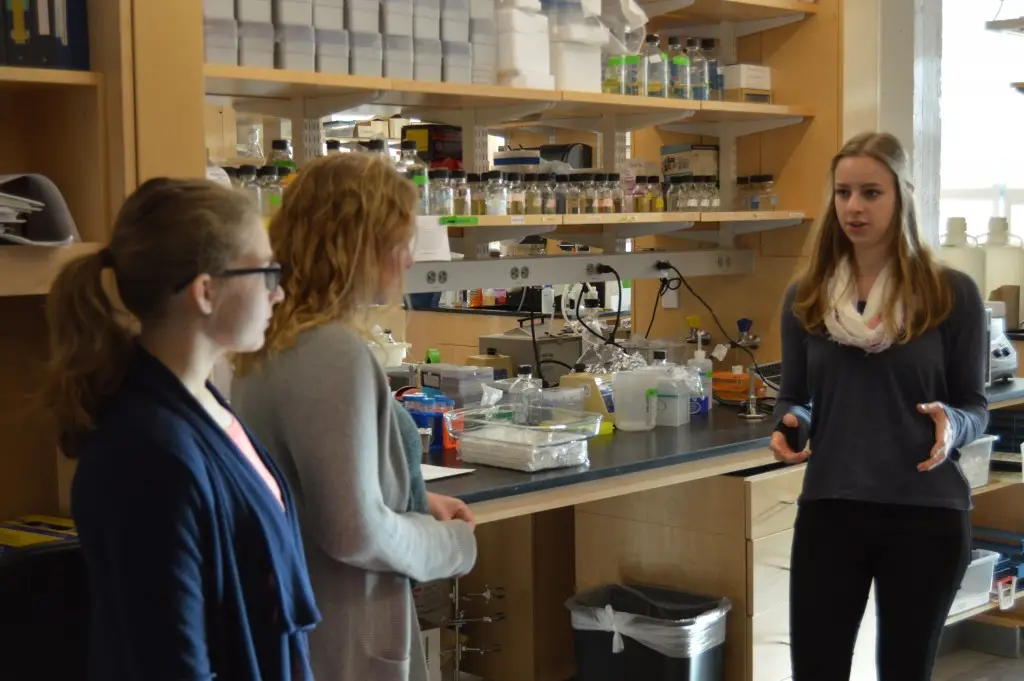
- Acceptance rate: 11.4%
- Average entry score: 1440-1550 SAT or 33-35 ACT
- Student-to-faculty ratio: 9:1
- Estimated cost of attendance (tuition and fees): $81,700
- Average earning potential for graduates: $18,400 (Grad Reports)
Tufts University offers biochemistry as an interdepartmental major that draws on the expertise of several departments, including chemistry and biology. The curriculum includes courses that explore the chemical processes that take place inside living organisms and how these processes help maintain life.
The program is designed for students who are interested in pursuing careers as research scientists, medical doctors, or veterinarians. As part of the curriculum, students can take elective courses from the chemistry and biology departments as well as participate in research opportunities during their junior and senior years.
#19. University of South Carolina

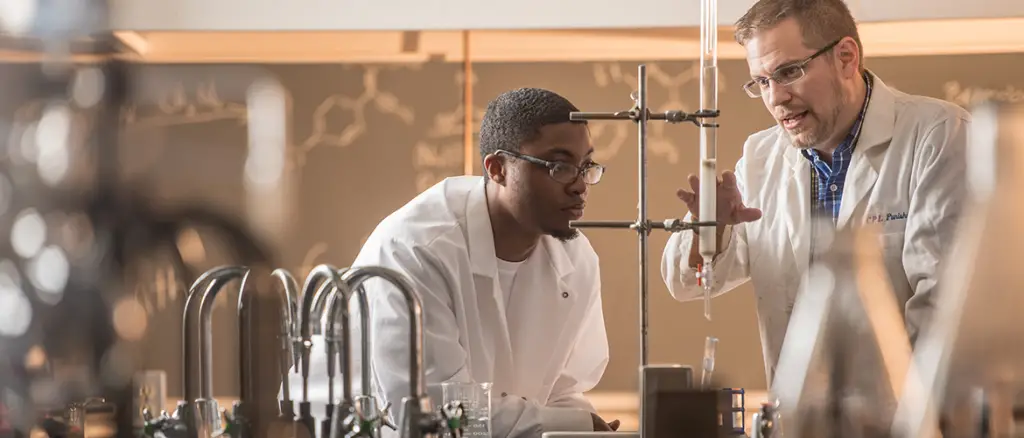
- Acceptance rate: 61.6%
- Average entry score: 1150-1360 SAT or 26-31 ACT
- Student-to-faculty ratio: 18:1
- Estimated cost of attendance (tuition and fees): $30,409-$51,649
- Average earning potential for graduates: $25,473 (College Factual)
The Biological Sciences and Chemistry departments at the University of South Carolina offer a combined major in the two subjects.
Students pursuing this degree can work toward becoming researchers, doctors, or scientists. The program emphasizes problem-solving and critical thinking skills as students learn about the structure of matter, chemical reactions, biological systems, and more.
The degree also includes a research component, which students can use to gain experience in their desired field. Students have access to labs and other resources that help them develop the skills they need for their future careers.
#18. University of Michigan– Ann Arbor

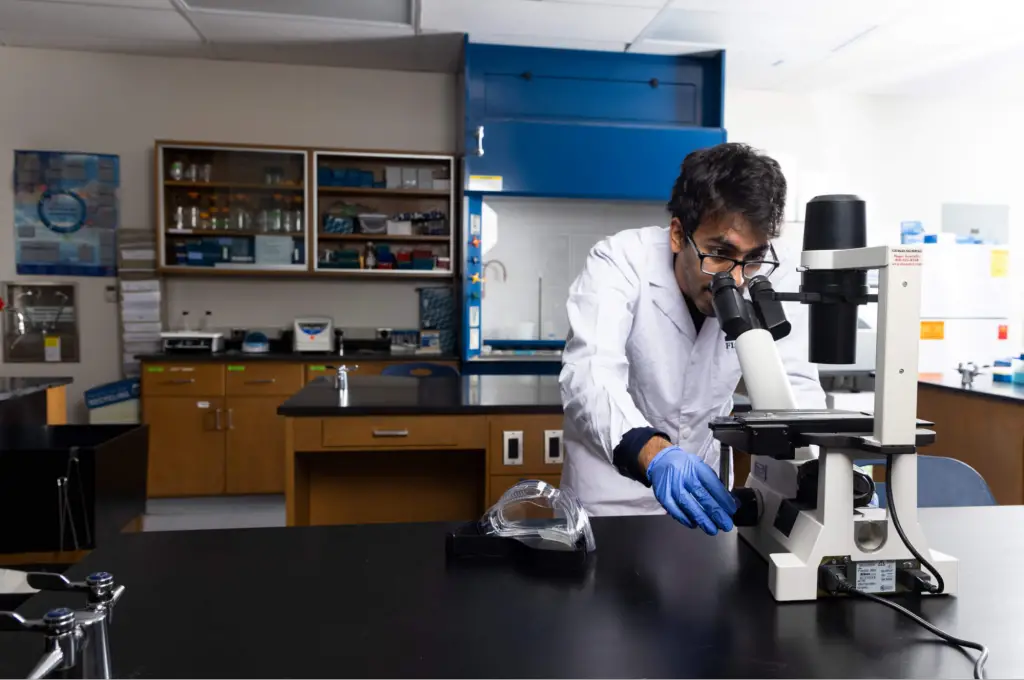
- Acceptance rate: 20.2%
- Average entry score: 1360-1530 SAT or 31-34 ACT
- Student-to-faculty ratio: 15:1
- Estimated cost of attendance (tuition and fees): $32,272-$69,326
- Average earning potential for graduates: $18,827 (College Factual)
The University of Michigan–Ann Arbor equips students with the knowledge and skills they need to succeed in their future chemistry careers. This school offers an undergraduate degree in biochemistry that trains students in the study of biological systems and chemical reactions.
With access to more than a dozen research labs, students can get hands-on experience with cutting-edge technologies and techniques in the field. The program also features an extensive internship program that allows students to gain work experience while they earn their degrees.
This biochemistry program prepares students for graduate studies. Students who graduate from the University of Michigan-Ann Arbor with a biochemistry degree will be prepared to enter the industry or continue their education at the graduate level.
Similar articles like this:
- 25 Best Dental Schools In The US
- 25 Best Schools For Geology In The US
- 25 Best Schools For Marine Biology In The US
#17. New York University

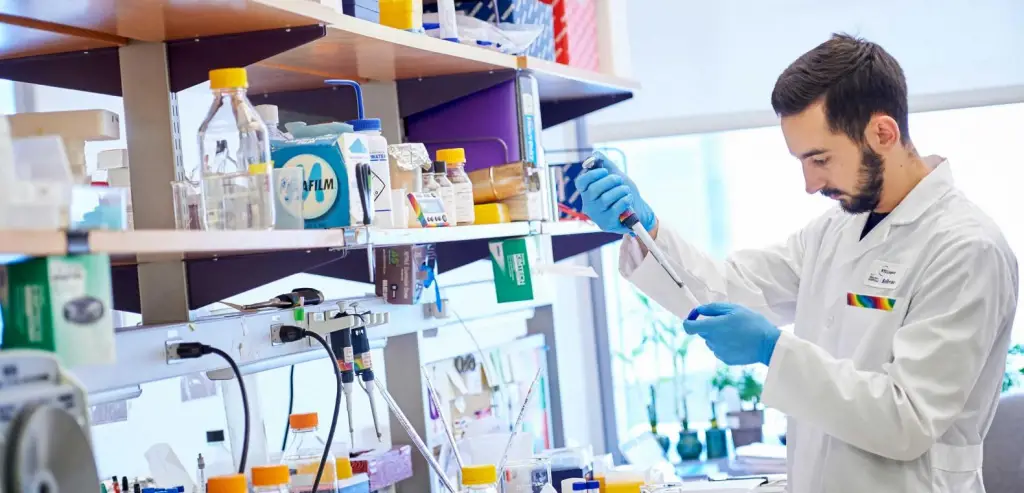
- Acceptance rate: 13%
- Average entry score: 1450-1570 SAT or 32-35 ACT
- Student-to-faculty ratio: 8:1
- Estimated cost of attendance (tuition and fees): $80,878
- Average earning potential for graduates: $31,324 (College Factual)
New York University’s College of Arts and Sciences offers a biochemistry degree program that gives students an in-depth understanding of the processes by which life is maintained. The program covers all aspects of biochemistry, including structure and function at the molecular level.
Students will learn how to apply their knowledge in real-world situations by conducting research and working with faculty members on cutting-edge projects.
NYU’s College of Arts and Sciences emphasizes integrating theory and practice, making it an ideal program for students who want to make a difference in the real world. The school’s location in New York City also provides students access to some of the best laboratories and research facilities.
#16. Georgetown University

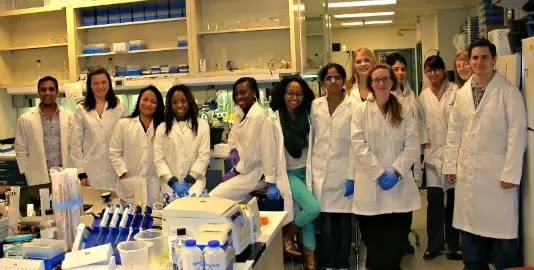
- Acceptance rate: 12%
- Average entry score: 1380-1550 SAT or 31-35 ACT
- Student-to-faculty ratio: 11:1
- Estimated cost of attendance (tuition and fees): $78,754
- Average earning potential for graduates (With Master’s): $51,817 (College Factual)
The Department of Chemistry at Georgetown University offers an undergraduate degree program that prepares students for careers in the field of biochemistry. This department’s faculty comprises members with diverse backgrounds who actively research and publish their findings in peer-reviewed journals.
The department’s website states that it has a long-standing history of fostering student success and provides a number of resources to help students reach their goals. Georgetown’s chemistry department provides students with opportunities to conduct research, either independently or in collaboration with faculty members.
This science program allows students to work in laboratories, conduct independent studies, and participate in seminars given by faculty members and visiting scholars.
#15. Emory University
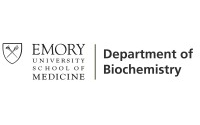

- Acceptance rate: 13.1%
- Average entry score: 1420-1540 SAT or 32-34 ACT
- Student-to-faculty ratio: 9:1
- Estimated cost of attendance (tuition and fees): $75,594
- Average earning potential for graduates: $26,500 (College Factual)
The chemistry department at Emory University, located in Atlanta, offers bachelor’s degrees in chemistry and biochemistry. This academic institution focuses on cell biology, biochemistry, developmental and cancer biology.
Emory University’s chemistry department provides students with an environment that promotes lifelong learning. The faculty members are highly qualified to teach various organic chemistry and biochemistry courses.
Students will enjoy the many opportunities to learn more about chemistry and biochemistry through research, internships, and co-op experiences. In addition, students have access to numerous resources, including an extensive library collection.
#14. Carnegie Mellon University

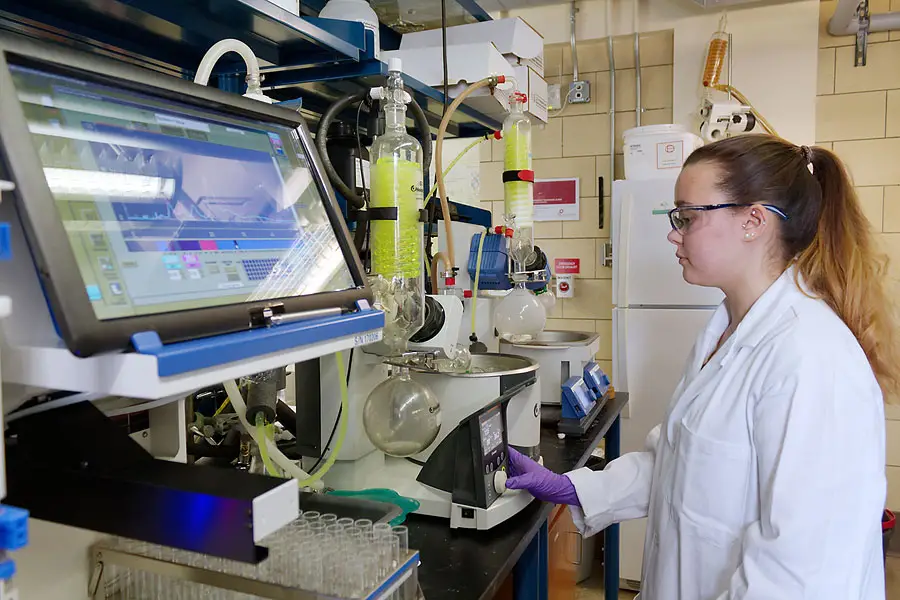
- Acceptance rate: 13.5%
- Average entry score: 1480-1560 SAT or 33-35 ACT
- Student-to-faculty ratio: 6:1
- Estimated cost of attendance (tuition and fees): $77,474
- Average earning potential for graduates: $37,145 (Glassdoor)
Biochemistry is one of the degrees offered by Carnegie’s Department of Chemistry. The Carnegie Mellon biochemistry program allows students to gain a broad understanding of their chosen field, as well as more in-depth knowledge within a specific area.
Students will learn how to apply biochemistry to various disciplines, including medicine and community health. They also have the opportunity to take courses in related areas such as molecular biology, genetics, and genomics.
Carnegie Mellon’s biochemistry degree prepares students for careers in pharmaceutical and biotechnology industries, as well as academic research.
Similar articles like this:
- 25 Best Schools For Agricultural Sciences In The US
- 25 Best Schools For Renewable Energy Degrees In The US
- 25 Best Engineering Schools In The US
#13. University of California, Los Angeles


- Acceptance rate: 10.8%
- Average entry score: 1290-1520 SAT
- Student-to-faculty ratio: 18:1
- Estimated cost of attendance (tuition and fees): $16,847-$31,949
- Average earning potential for graduates: $31,100 (College Factual)
The University of California, Los Angeles, offers a biochemistry graduate program that the American Society accredits for Biochemistry and Molecular Biology. Students will study with some of the world’s leading scientists in their field.
The UCLA biochemistry program offers students the opportunity to work on cutting-edge research projects and gain hands-on experience through laboratory rotations. UCLA’s biochemistry and molecular biology degree program includes a research-intensive curriculum that will prepare students for careers in the pharmaceutical industry.
UCLA also has a graduate degree program focusing on biochemistry, molecular, cell, and developmental biology. The graduate students have access to state-of-the-art facilities to work on their research projects.
#12. University of Notre Dame

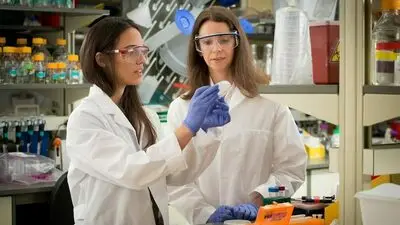
- Acceptance rate: 15.1%
- Average entry score: 1410-1550 SAT or 32-35 ACT
- Student-to-faculty ratio: 9:1
- Estimated cost of attendance (tuition and fees): $78,347
- Average earning potential for graduates: $33,000 (School Authority)
Located in St. Joseph County, Indiana, the University of Notre Dame is a private research university with an undergraduate enrollment of over 7,000 students. The University of Notre Dame offers a biochemistry degree program that can be completed in four years.
As a top research university, the University of Notre Dame has many different research programs that students can participate in. Biochemistry students have access to state-of-the-art facilities and equipment to conduct their experiments.
The graduate students also have the opportunity to work in one of the many research labs that are located on campus. At the University of Notre Dame, there are many ways students can get involved with research.
#11. Columbia University


- Acceptance rate: 4.1%
- Average entry score: 1440-1570 SAT or 34-35 ACT
- Student-to-faculty ratio: 6:1
- Estimated cost of attendance (tuition and fees): $85,000
- Average earning potential for graduates: $17,500
The Department of Biochemistry and Biophysics at Columbia University is one of the largest departments in its field. They offer a wide range of courses and research opportunities for students interested in biochemistry and biophysics.
At Columbia University, you’ll learn molecular biology, cell biology, and genetics from some of the best professors in their fields. You’ll also have access to modern facilities for research and hands-on experience working in a lab environment.
Most graduates of Columbia University’s program go on to work in research, academia, or medicine. The department has strong connections to the industry. You may also be able to find a job immediately after graduation.
#10. Washington University St. Louis


- Acceptance rate: 53.2%
- Average entry score: 1220-1470 SAT or 29-34 ACT
- Student-to-faculty ratio: 9:1
- Estimated cost of attendance (tuition and fees): $30,640-$58,470
- Average earning potential for graduates: $33,446 (Glassdoor)
Washington University St. Louis is home to one of the best biochemistry programs in the country. You’ll learn how cells process information and interact with their environment by studying topics like molecular biology and cell signaling.
The program is ideal for students who want to pursue a career in medicine or research. You’ll also have opportunities to learn from renowned faculty, participate in research projects and gain experience through an internship or summer research program.
Graduates of this biochemistry program typically go on to earn a Ph.D. degree or work in industry or academia.
Similar articles like this:
- 25 Best Forestry Schools In The US
- 25 Best Schools For Environmental Science In The US
- 25 Best Schools For Health Sciences Degrees In The US
#9. Rice University

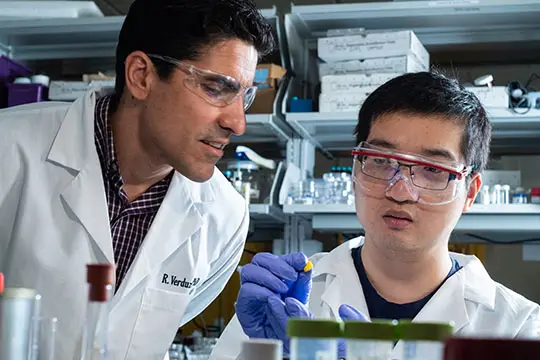
- Acceptance rate: 9.5%
- Average entry score: 1490-1570 SAT or 34-35 ACT
- Student-to-faculty ratio: 6:1
- Estimated cost of attendance (tuition and fees): $74,110
- Average earning potential for graduates: $15,270 (Grad Reports)
Rice University is a private research university located in Houston, Texas. The school offers more than 100 bachelor’s, graduate, and doctoral degree programs across its academic divisions.
Rice’s biochemistry program provides an innovative curriculum that combines coursework with hands-on learning opportunities such as internships and summer research programs.
In addition to the biochemistry curriculum, students can choose from a wide range of majors in fields such as chemistry and biological sciences. The school also offers several pre-professional programs for those who plan on becoming doctors or pharmacists. Rice University is highly selective, and admission is competitive.
#8. Vanderbilt University
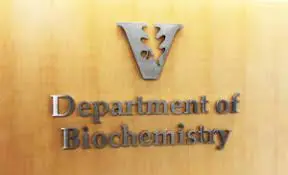
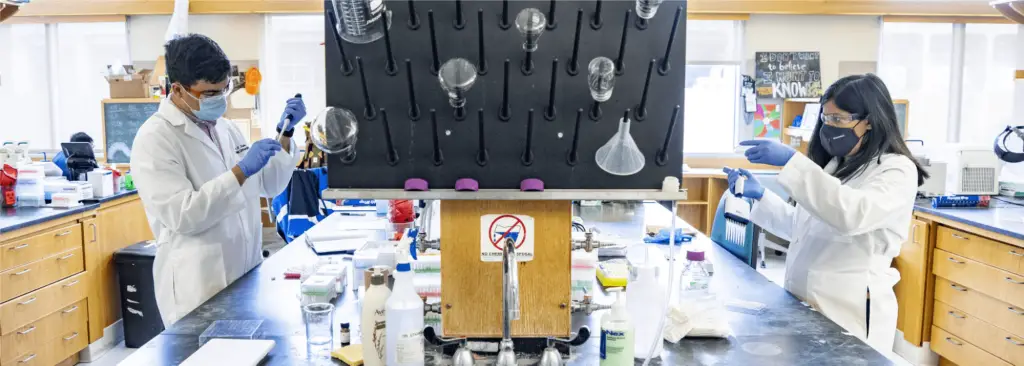
- Acceptance rate: 7.1%
- Average entry score: 1480-1570 SAT or 34-35 ACT
- Student-to-faculty ratio: 8:1
- Estimated cost of attendance (tuition and fees): $79,558
- Average earning potential for graduates: $14,373 (College Factual)
Vanderbilt University is a private research university located in Nashville, Tennessee. The school offers undergraduate, graduate, and doctoral degree programs to over 15,000 students.
Vanderbilt is known for its strong undergraduate programs and research opportunities. The school offers more than 200 majors and minors in the fields of humanities, social sciences, engineering, natural sciences, and medicine.
Vanderbilt’s program provides biochemistry majors with an understanding of the field through hands-on learning opportunities such as internships, research positions, and summer research programs. Besides coursework, students must complete a senior thesis or project to graduate with a bachelor’s degree in biochemistry.
#7. Brown University

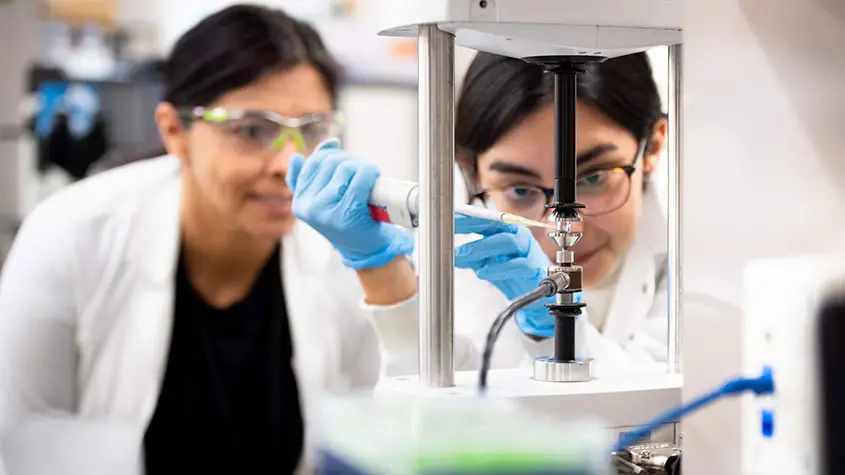
- Acceptance rate: 5.5%
- Average entry score: 1460-1570 SAT or 33-35 ACT
- Student-to-faculty ratio: 6:1
- Estimated cost of attendance (tuition and fees): $84,986
- Average earning potential for graduates: $29,060 (Grad Reports)
Located in Providence, Rhode Island, Brown University is an Ivy League research university. The university has one of the highest international student populations of any American university. It also has an impressive number of research centers.
Brown’s biochemistry program is created for students who want to pursue a career in medicine or research. However, it can also be used as preparation for graduate school. The curriculum includes general chemistry, organic chemistry, and biochemistry courses like molecular biology and genetics.
As a leading research institution in the fields of medicine and biochemistry, students will have plenty of opportunities to get involved with research while at Brown.
#6. Duke University

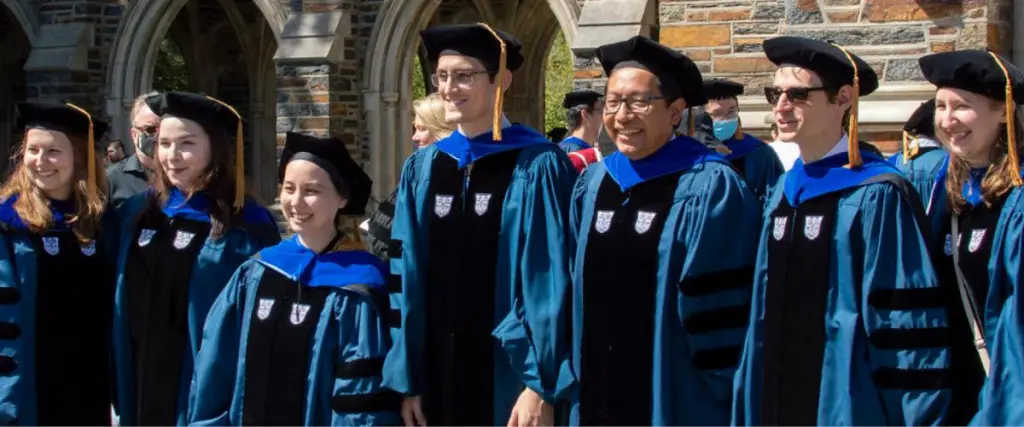
- Acceptance rate: 5.9%
- Average entry score: 1480-1570 SAT or 33-35 ACT
- Student-to-faculty ratio: 8:1
- Estimated cost of attendance (tuition and fees): $84,517
- Average earning potential for graduates: $34,300 (College Simply)
Duke University is a private research university located in Durham, North Carolina. The school has been consistently ranked as one of the top universities in the country and is also known for its strong biochemistry program. Duke University offers a wide range of undergraduate degrees, including degree programs in biochemistry.
Graduates of the biochemistry program at Duke University have gone on to pursue careers in many different fields, including medicine, scientific research, and biotechnology. The biochemistry major at Duke gives students a broad-based education in biochemistry, with coursework covering topics like molecular biology and biophysics.
In addition to their academic studies, students can also participate in research opportunities at Duke University.
What’s it like to study biochemistry at Duke University?
Similar articles like this:
- 25 Best Immunology Schools In The US
- 25 Best Microbiology Schools In The US
- 25 Best Education Schools In The US
#5. University of Pennsylvania

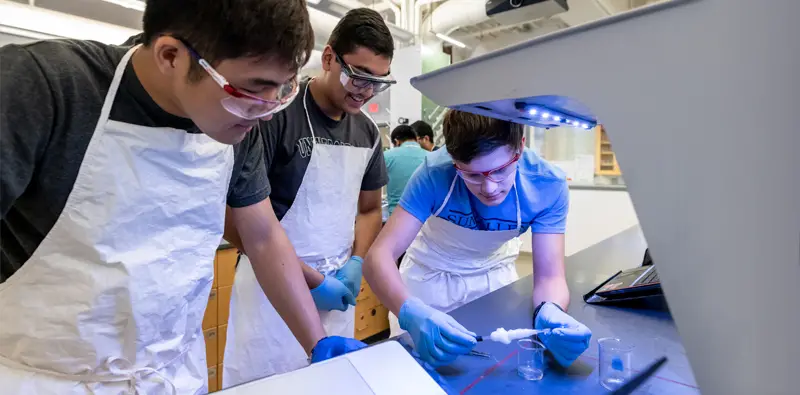
- Acceptance rate: 5.9%
- Average entry score: 1460-1570 SAT or 33-35 ACT
- Student-to-faculty ratio: 7:1
- Estimated cost of attendance (tuition and fees): $65,790
- Average earning potential for graduates: $35,952 (Campus Reel)
The major in biochemistry at the University of Pennsylvania is accredited by the American Chemical Society and offers students a variety of opportunities for research experience.
This program includes core courses in chemistry and biology, as well as electives that allow students to pursue their individual interests in areas like molecular genetics and protein structure.
This institution boasts a strong faculty that includes many notable researchers. The University of Pennsylvania’s robust research program offers students the opportunity to participate in individual projects and gain hands-on experience.
What’s it like to study biochemistry?
#4. Johns Hopkins University

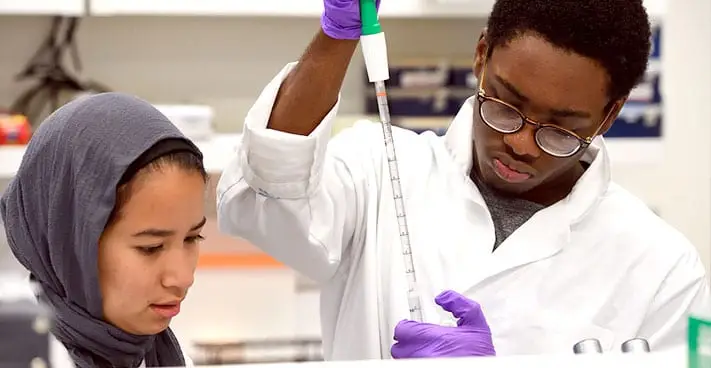
- Acceptance rate: 7.5%
- Average entry score: 1510-1570 SAT or 34-35 ACT
- Student-to-faculty ratio: 7:1
- Estimated cost of attendance (tuition and fees): $78,657
- Average earning potential for graduates: $37,800 (College Simply)
Johns Hopkins University offers courses in the biochemistry department that cover a wide range of topics, including biochemistry and organic chemistry. The school also has a strong graduate program that allows students to pursue independent research projects under the guidance of faculty members.
This university boasts a long history of excellent research and attracts many renowned faculty members. The school has many notable alumni who have gone on to become leaders in their fields. What’s more? Johns Hopkins University has modern labs and facilities that are equipped with state-of-the-art equipment.
What’s it like to study biochemistry at Johns Hopkins University?
#3. Yale University

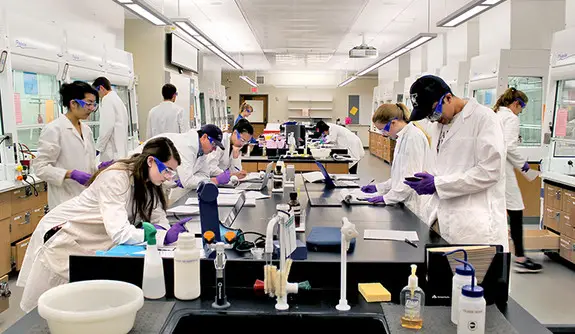
- Acceptance rate: 5.3%
- Average entry score: 33-35 ACT
- Student-to-faculty ratio:6:1
- Estimated cost of attendance (tuition and fees): $84,525
- Average earning potential for graduates: $33,000 (School Authority)
Study biochemistry at one of the top research universities in the world. Its location in New Haven allows students to experience life on a small campus while being part of an urban environment. Yale is known for its excellent undergraduate and graduate programs in biochemistry, as well as its innovative research facilities.
The university is also home to one of the world’s largest academic libraries, which boasts nearly 15 million volumes. Students can expect a rigorous curriculum that will prepare them for a career in biochemistry or related fields.
What’s it like to study at Yale University?
#2. Harvard University

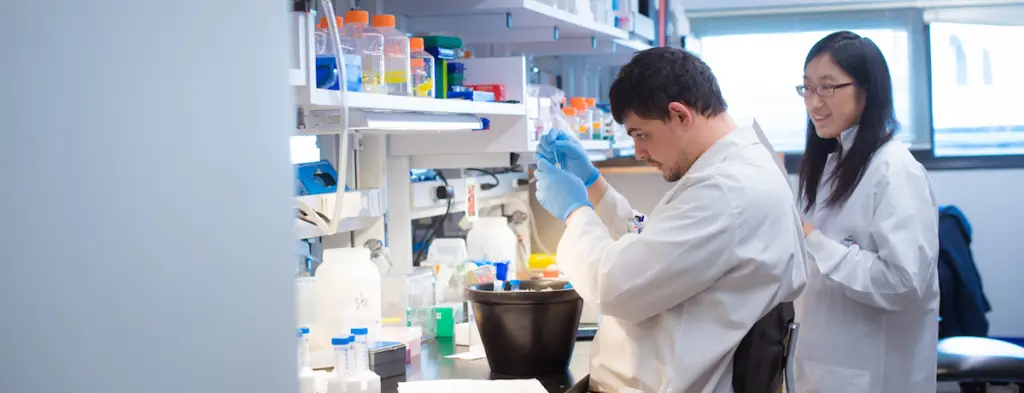
- Acceptance rate: 4%
- Average entry score: 1460-1580 SAT or 33-35 ACT
- Student-to-faculty ratio: 7:1
- Estimated cost of attendance (tuition and fees): $78,200
- Average earning potential for graduates: $35,060 (Grad Reports)
Harvard University is one of the world’s most prestigious universities and has been ranked as the top institution for research on multiple occasions. The university offers undergraduate and graduate programs in biochemistry, as well as other areas of biology and chemistry.
Students can join multidisciplinary research groups or work independently on their own projects in labs equipped with state-of-the-art equipment.
The curriculum is designed to give students an understanding of the theoretical aspects of biochemistry as well as practical skills that can be applied in the real world. This school also has a strong record of placing its graduates in excellent positions after graduation, including some of the world’s largest pharmaceutical companies.
What’s it like to study at Harvard University?
#1. Princeton University

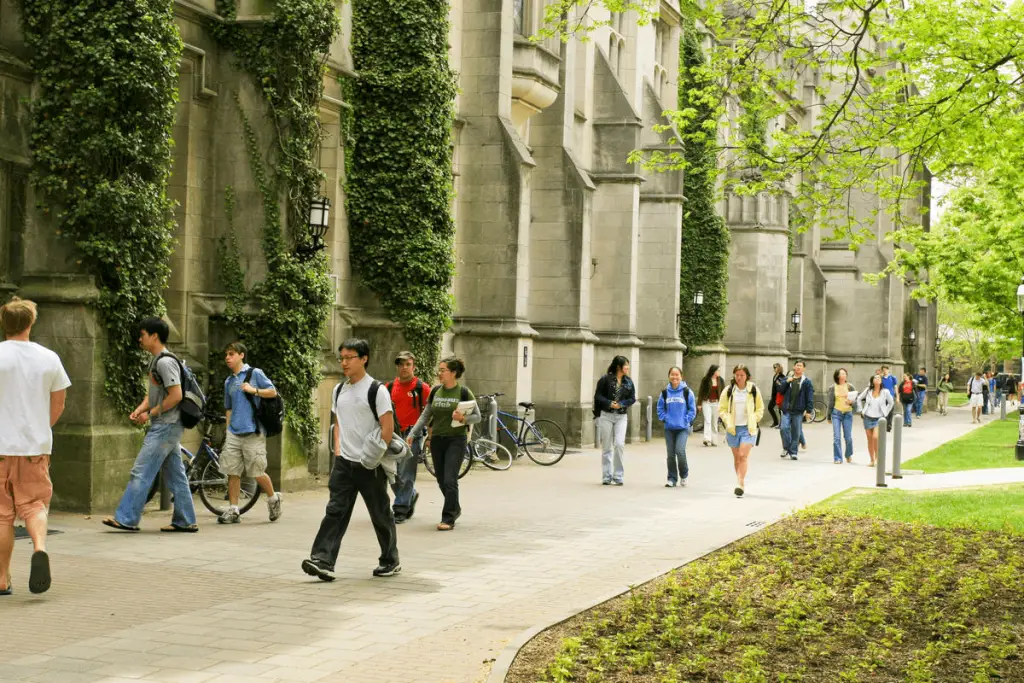
- Acceptance rate: 4.4%
- Average entry score: 1570 SAT or 35 ACT
- Student-to-faculty ratio: 5:1
- Estimated cost of attendance (tuition and fees): $78,490
- Average earning potential for graduates: $30,000 (College Factual)
With world-class facilities, a small student body, and an intimate campus setting, Princeton is a great place to study. The university offers an undergraduate degree in Biochemistry, focusing on the chemical basis of living organisms.
This program combines courses in molecular biology, genetics, biotechnology, and many other areas. The curriculum also includes intensive laboratory research, allowing students to work on projects directly related to their courses.
Princeton’s biochemistry program at Princeton is designed for students who are looking forward to joining a medical school. The curriculum emphasizes hands-on learning and provides a strong foundation in the life sciences.
What’s it like to study at Princeton University?
Conclusion
The best American biochemistry and molecular biology colleges offer students ample opportunities to pursue their interests and career goals. These top schools provide students access to the latest technology, research opportunities, and world-renowned faculty.
The best colleges also have strong biochemistry programs, supportive environments, and abundant career prospects.
A degree from a US biochemistry school can prepare you for work in the pharmaceutical, biotech, or academic research industries. Our article highlights the top biochemistry schools in the US and how they can help you get started on an exciting career path.
Selection Criteria
Here is a list of the criteria we used to select the 25 best colleges for biochemistry in America:
- Reputation and ranking of the school: We considered schools with a strong reputation and high ranking in the biochemistry field.
- Faculty expertise and specialization: We researched the faculty member’s areas of expertise to ensure that the biochemistry department has experts in all major fields.
- Facilities, resources, and access to technology: Our team considered the quality of the school’s facilities and resources, including access to laboratories, equipment, and libraries. We also considered how recent advances in biochemistry would be reflected in a student’s curriculum at that institution.
- Cost and financial aid: Our research took into account both the cost of attendance and the availability of financial aid for students.
- Diversity and inclusivity: We considered the school’s commitment to diversity and inclusivity as we made our decision. We believe that an inclusive environment will contribute to your overall learning experience at this institution.
- Graduation and placement rate: Our research team looked at the school’s graduation and placement rates to determine how well students fared after graduation.
- Extracurricular activities: We evaluated the availability of clubs and other activities that would appeal to you.
- Alumni network and post-graduation support: We considered the school’s alumni network and its post-graduation support services when we evaluated. These are important factors in finding jobs and receiving mentorship.
Frequently Asked Questions
Q1. What are the admission requirements for biochemistry programs at top universities?
Admission requirements for biochemistry programs at top universities typically include a strong academic background in science and mathematics. You must also have high scores on standardized tests such as the ACT or SAT.
Some universities may also require letters of recommendation and a personal statement. Additionally, applicants should be prepared to demonstrate their interest in biochemistry through research or other related experiences.
Q2. What type of research opportunities is available for biochemistry students at these schools?
Biochemistry students at top universities can access a wide range of research opportunities, from working in faculty-led research labs to participating in independent study projects.
These opportunities allow students to gain hands-on experience in biochemistry and contribute to the advancement of the field. Many top schools also offer funding and support for student research, including grants and fellowships.
Q3. Are there any scholarship opportunities for biochemistry students at top US schools?
Many scholarships are available to biochemistry students at top US schools. These scholarships may be offered by the university, professional organizations in the field, or private foundations.
Some scholarships specifically target biochemistry students, while others may be more broadly available to science students.
Q4. What type of job prospects can be expected with a degree in biochemistry from a top school?
A degree in biochemistry from a top school can open up many career opportunities in fields such as pharmaceuticals, biotechnology, academic research, and more.
Graduates with a biochemistry degree from a top school may find employment as research scientists, biochemists, pharmaceutical sales representatives, and more. In general, biochemists with advanced degrees and experience in the field tend to have the best job prospects.
Q5. What are the class sizes and student-to-faculty ratios like in the biochemistry programs at top schools?
Class sizes and student-to-faculty ratios in biochemistry programs at top schools can vary widely. Some top schools may have large lecture classes with hundreds of students, while others may have smaller, more intimate classes.
In general, top schools tend to have lower student-to-faculty ratios, which can provide students with more individual attention and support.
References
[1] Official Websites
[2] Salary Data from Glass Door, College Factual, College Simply, Zippia, Gradreports
[3] Ranking references including news media such as Best Global Universities for Biology and Biochemistry in the United States

